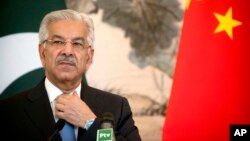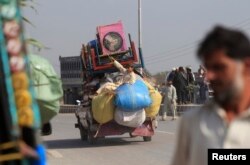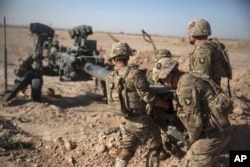Pakistan's Foreign Minister Khawaja Muhammad Asif says other countries in the region may be able to sway the Taliban into peace talks better than Islamabad, including Russia.
"At least for our influence on Taliban today, there is a mistrust ... perhaps they have more influence from other countries in that region than in our Pakistan," Asif said Thursday when asked by VOA's Urdu service whether he was referring to Russia.
Asif was speaking to reporters in Washington a day after meeting with U.S. Secretary of State Rex Tillerson to discuss issues of mutual concern, such as Afghanistan.
The Pakistani foreign minister said an upcoming four-way round of talks on Afghanistan was slated for Oman's capital, Muscat, on October 16.
"The quadrilateral arrangement will again be in operation. So, that is something we still hope will ... still work," Asif said.
He gave no further details on the talks or who would be attending.
Quadrilateral group restored
Pakistani Prime Minister Nawaz Sharif and Afghan President Ashraf Ghani agreed in June to revive the Quadrilateral Coordination Group, made up of Afghanistan, China, Pakistan and the United States. The group last met in May 2016 and fell into disarray with the Taliban's refusal to take part, a change in U.S. leadership, and bickering between Islamabad and Kabul.
Asif urged the United States to act as a facilitator between Pakistan and Afghanistan.
"We need the bilateral contacts, which were resumed three or four days back with Kabul and Islamabad. The Americans will support us in this process," Asif said.
Pakistan has rejected U.S. accusations that it is not doing enough to fight terrorism on its own soil.
Asif told VOA Urdu that Pakistan is going beyond offering Kabul joint-border monitoring and is asking for Afghan military commanders to help identify hideouts of Taliban inside Pakistan.
"We offered them — don't give us information, board the helicopter with us, tell us the coordinates — we'll straight go over there," he said. "You want us to sniff them out? We'll do that. You want us to take action against them? Whatever action you propose, we'll do that. But, ... these hollow allegations are not acceptable."
Russia in Afghanistan
Russia's influence has slowly been returning to Afghanistan since the Soviet Union's 1979 invasion ended in defeat at the hands of the U.S.-backed mujahedeen.
Since launching a 2001 war against the Taliban for harboring al-Qaida terrorists, U.S. forces have gradually drawn down from the protracted conflict, providing room for Russia to assert itself.
Since December, Moscow has hosted three rounds of expanding international talks on Afghanistan, which the Taliban also has refused to support. For the second round in February, Russia invited Afghan representatives for the first time after Kabul and Washington raised concerns about their exclusion.
For the last round in April, Moscow invited former Soviet Central Asian states to join Afghanistan, China, India, Iran and Pakistan for a total of 11 countries. The United States also was invited, but Washington declined, saying it was not informed of the agenda beforehand and was unclear of the meeting's motives.
The Taliban so far has refused direct talks with Kabul, calling it a "U.S. puppet," and has declined to support the Moscow-led talks.
Russia acknowledged in 2016 it has been in direct contact with the Taliban leaders, but insists it is part of efforts to promote peace, and it has denied allegations of supplying or arming the Taliban.
Just days ahead of the February talks, however, the top U.S. commander in Afghanistan said Russia was legitimizing and supporting the Taliban.
Pakistan has said Russia is "positively" using its influence with the Taliban and wants the U.S. to participate in the talks initiated by Moscow.
VOA's Urdu service contributed to this report.


